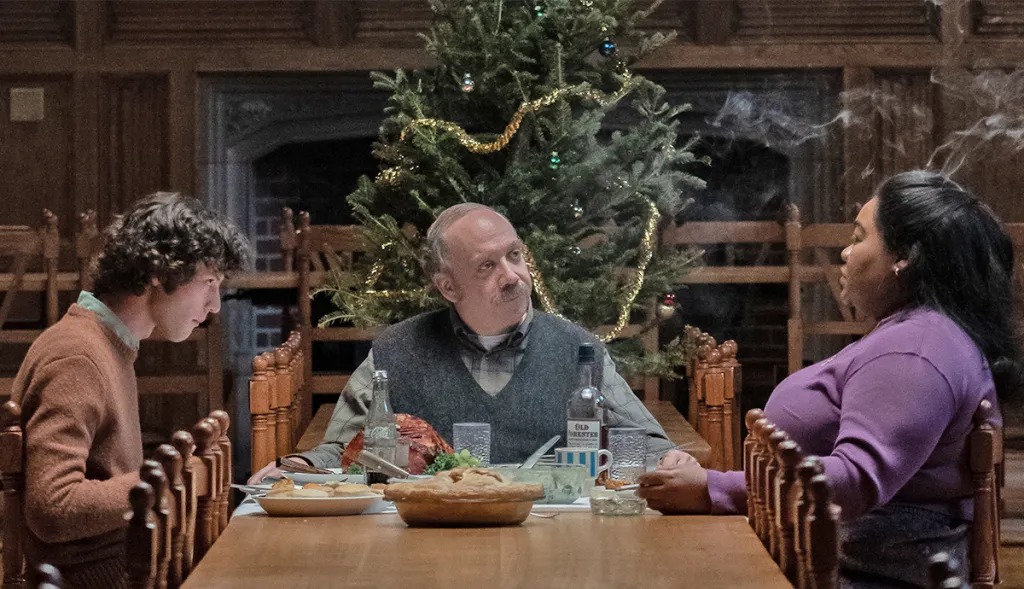Alexander Payne’s newest feature is a pleasant dramedy for this coming holidays season. Set in a 1970 remote New England winter, boarding school history teacher Paul Hunham (Paul Giamatti) is tasked with supervising the few students who can’t go home during Christmas break, the holdovers.
When a helicopter sent by one of the students’ rich daddy comes to pick up the group, Angus Tully (Dominic Sessa) is left behind as he is just like his cranky history teacher at Barton Academy, unpopular among his peers. Angus’ pain stems more from being abandoned by his mother who wants to spend Christmas with her new boyfriend alone. Together with the chief cook of the school Mary Lamb (Da’Vine Joy Randolph), a grieving mother who has just lost his son in Vietnam, three damaged souls are left to spend their winter holidays in an empty boarding school.
Payne has won two Oscars for Best Writing, Adapted Screenplay, for The Descendants (2011) and Sideways (2004), both with which he was also nominated for Directing. His third directing Oscar nom was for the black-and-white feature Nebraska (2014). Payne’s forte of capturing the humanity in conflicting relationships is apparent in his works. Such is the main drive and the fun found in The Holdovers, where we see Payne reunites with Sideways‘s Giamatti. The idea for the film came from a 1935 French movie, but interestingly, Payne chose to have the TV writer David Hemingson do the screenplay, his debut feature.
The story idea isn’t new, misfits thrown together in reluctant circumstances starting out repelling each other but through unexpected turns of events, human decency shines through. Watching The Holdovers brings back memories of Dead Poets Society and Scent of a Woman. But this is a much lighter and warmer feature with nonetheless poignancy towards the end. Payne’s signature style of sprinkling humour with pathos is prevalent here, at times even with slapstick, Chaplain-like actions added in. Later a road trip to Boston solidifies the unlikely companionship, events leading to the triumphant transformation of self for all three characters.
The 133-minute screen time could be tightened though, especially in the first part where it feels likes the story has not started until everyone has gone and only the three remaining characters are left in the empty school. It then picks up momentum when a road trip is in gear. The first part is set up for slow-paced viewing offering scenic New England in the snow; the song selections are appealing, and maybe with a touch of sarcasm. While waiting for the inciting turn to kick start the story, viewers can sit back and maybe for some, reminisce on their own prep school experiences.
He may be pompous and grumpy, Hunham’s sadistic approach to teaching just shows that his intention is genuine in preparing his students to enter Ivy League schools by their own academic merits and not because their fathers give money for a new building or a fancy gym. He even has the gall to fail a senator’s son, hence, his unpopular status among the principal, faculty, and needless to say, his students. As a classics and ancient history teacher, Hunham’s personal vernacular is where some of the humor lies. His lines are quotable quotes. Giamatti is perfectly cast, a natural in portraying such an eccentric. Come awards time, he is likely to be noted for his performance.
Da’Vine Joy Randolph as Mary is superb. Despite nursing deep loss, she is sensitive to others’ needs, a character foil against Hungham. her quiet presence exudes a much needed sensibility to balance out the incompatible trio. It’s always heartwarming to see human decency and kindness seep through the clouds of personal pain.
Sessa is discovered from an audition at an actual New England boarding school. It’s interesting that he looks more mature than a high school student. So, in that sense, he doesn’t seem to be a fitting cast. However, to make up for his appearance, his acting is natural and in this his movie debut, has shown himself to be a pristine actor with much potential.
The Holdovers could make another crowd pleasing Christmas movie with holding power in the years to come. It’s easy viewing and inviting for rewatch, especially to catch the quotable lines, Hunham style.
~ ~ ~ Ripples
***
Related Ripple Review:
Nebraska (2013): Color is Superfluous
and a related quote from a previous post:
“Medicine, law, business, engineering, these are noble pursuits and necessary to sustain life. But poetry, beauty, romance, love, these are what we stay alive for.” — Dead Poets Society

